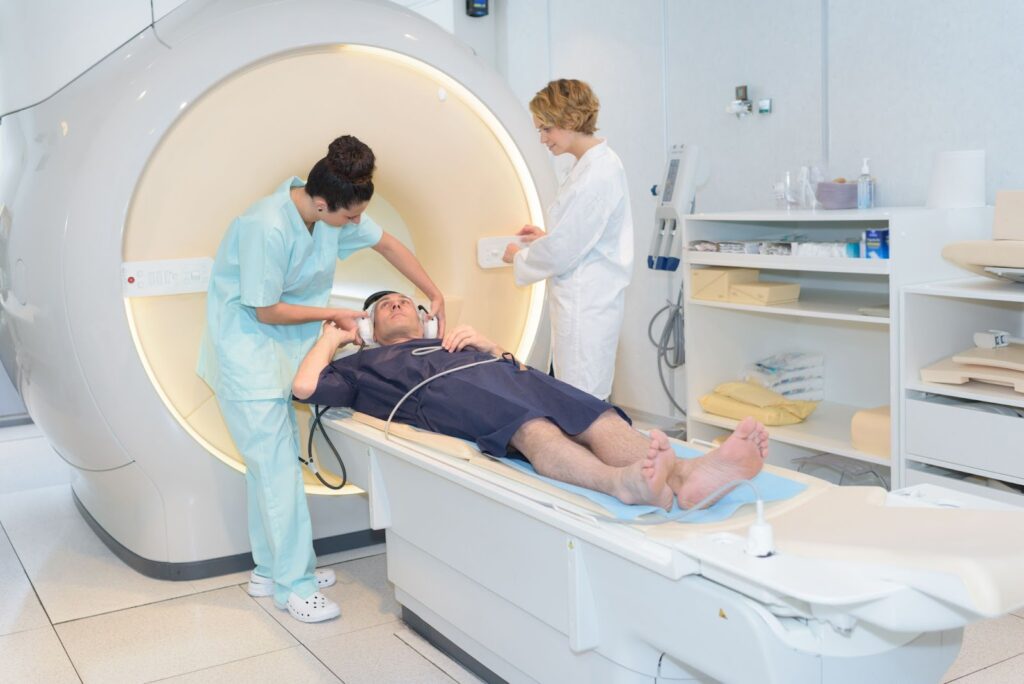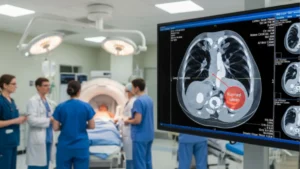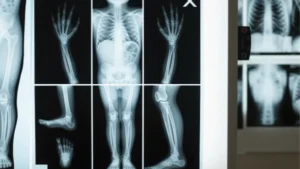For many people, the prospect of undergoing an MRI scan can be daunting—the confined space, loud noises, and the need to remain still for an extended period can trigger intense feelings of anxiety and fear.
This reaction, known as MRI claustrophobia, affects a significant number of patients and can sometimes lead to the postponement or cancellation of necessary medical imaging.
What is an MRI and its Importance in Medical Diagnosis
Magnetic Resonance Imaging (MRI) is a non-invasive diagnostic tool that uses magnetic fields and radio waves to create detailed images of the body’s internal structures. It is essential in medical diagnosis due to its ability to produce high-resolution images without the use of ionizing radiation.
- High-Resolution Imaging: MRI provides exceptionally detailed images of soft tissues, making it invaluable for diagnosing conditions in the brain, spinal cord, and joints. This precision helps doctors identify abnormalities that other imaging techniques might miss.
- Non-Invasive and Safe: Unlike X-rays or CT scans, MRI does not use ionizing radiation, reducing the risk of exposure to harmful radiation. This makes MRI a safer option for repeated imaging, especially in sensitive populations like pregnant women and children.
- Versatility in Diagnosis: MRI can be used to examine almost any part of the body, including the heart, blood vessels, and organs like the liver and kidneys. Its versatility allows for comprehensive evaluations and aids in accurate diagnosis and treatment planning for a wide range of medical conditions.
Understanding MRI Claustrophobia
MRI and claustrophobia can be related to one another. Not many people can tolerate being inside an MRI facility. The condition where people feel anxious about this process is called MRI machine claustrophobia. It refers to the intense fear or anxiety some individuals experience when undergoing an MRI scan.
Why MRIs Can Trigger Claustrophobia
The design and operation of MRI machines can provoke feelings of claustrophobia in many patients. Understanding the specific factors that contribute to this fear can help in developing effective coping strategies.
- Enclosed Space: MRI machines are typically narrow tubes that can make patients feel trapped or confined. This lack of space can be particularly distressing for those who are prone to anxiety or have a fear of enclosed spaces.
- Loud Noises: The scanning process involves loud, repetitive noises that can be startling and uncomfortable. These sounds, combined with the requirement to remain still, can exacerbate feelings of helplessness and panic.
Coping with Claustrophobia for Your MRI
There are several strategies that can help alleviate anxiety and make the experience more tolerable.
Before the Scan:
- Communication is Key: Discuss your fears with your doctor and the MRI technician beforehand. Clear communication ensures that the medical staff is aware of your anxiety and can take steps to make you more comfortable.
- Knowledge is Power: Learn about the MRI process and what to expect during the scan. Understanding the procedure can help reduce fear of the unknown and prepare you mentally for the experience.
- Preparation Techniques: Practice relaxation techniques such as deep breathing, meditation, or progressive muscle relaxation in the days leading up to your scan. These techniques can help calm your mind and body, making it easier to cope during the scan.
- Facility Options: Research facilities that offer open MRI machines or those with a more spacious design. Choosing a facility with equipment that feels less confining can significantly ease your anxiety.
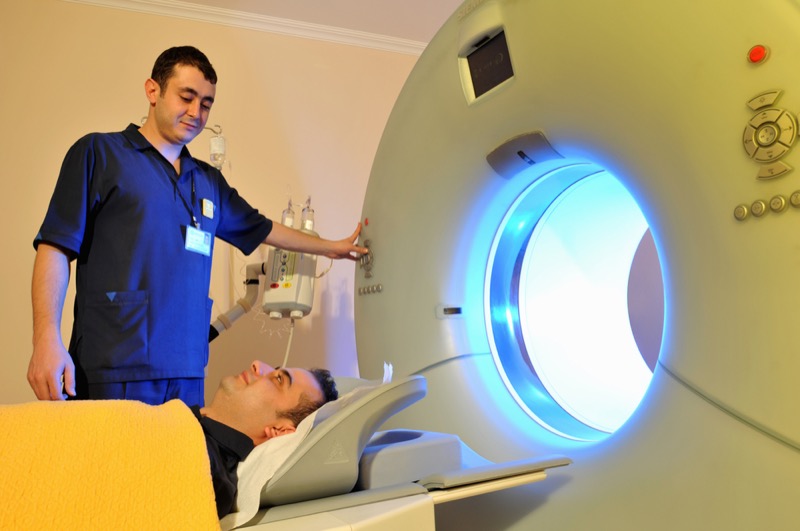
During the Scan
- Communication with the Technician: Maintain communication with the MRI technician during the scan. Knowing that you can speak with the technician and request a break if needed can provide a sense of control and reduce anxiety.
- Distraction Techniques: Use distraction methods such as listening to music or guided imagery through headphones provided by the facility. Focusing on something other than the scan can help take your mind off the confined space and loud noises.
- Medication Options: For severe anxiety, consider discussing medication options with your doctor. Mild sedatives or anti-anxiety medications can be prescribed to help you remain calm during the scan.
Alternatives and Support
- Alternative Imaging Techniques: While MRI is often the best option for detailed imaging, discuss alternative techniques like CT scans or ultrasounds with your doctor if appropriate. However, remember that MRI provides superior imaging for many conditions, making it worth the effort to manage claustrophobia.
- Support Groups and Resources: Consider joining support groups or accessing online resources to manage claustrophobia. Connecting with others who share similar experiences can provide valuable coping strategies and emotional support.
Strategies to Overcome MRI Claustrophobia
Overcoming MRI claustrophobia involves a combination of preparation, support, and relaxation techniques. Implementing these strategies can make the MRI experience more manageable and less stressful.
Pre-scan Visits
Scheduling a pre-scan visit to the MRI facility allows you to familiarize yourself with the environment and equipment. This can help reduce anxiety by making the setting feel more familiar and less intimidating.
Sedation or Anti-Anxiety Medication
Discussing the use of sedation or anti-anxiety medication with your doctor can be beneficial if your claustrophobia is severe. These medications can help you remain calm and relaxed during the scan, ensuring that the procedure goes smoothly.
“Open” MRI Machines
Opting for an “open” MRI machine, which has a more spacious design, can significantly reduce feelings of confinement. These machines are less claustrophobic and can provide a more comfortable experience for anxious patients.
Bringing a Friend or Family Member for Support
Having a friend or family member accompany you to the scan can provide emotional support and reassurance when it comes to claustrophobia in MRI machine. Their presence can help distract you from your fears and provide a sense of safety.
Using Headphones with Music or Guided Meditation
Listening to music or guided meditation through headphones can be an effective way to distract yourself during the scan. This can help mask the loud noises of the machine and create a more calming environment.
Practice Relaxation and Breathing Exercises
Practicing relaxation and breathing exercises before and during the scan can help manage anxiety. Techniques such as deep breathing, progressive muscle relaxation, and visualization can calm your mind and body, making the experience more tolerable.
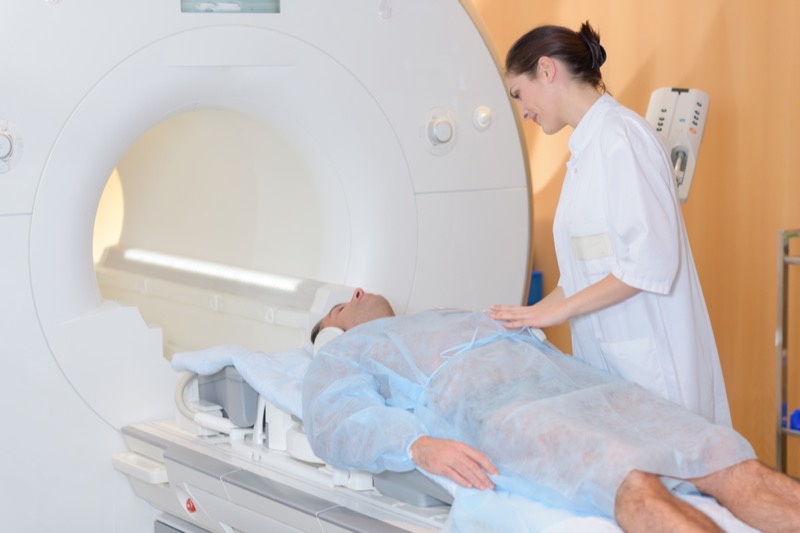
Manage MRI Claustrophobia with the Help of the Right MRI Facility
Dealing with MRI claustrophobia can be challenging, but with the right strategies, it is entirely manageable.
By understanding the causes of your anxiety and implementing techniques such as pre-scan visits, using claustrophobia open MRI machine, and practicing relaxation exercises, you can significantly reduce your discomfort.
At One Step Diagnostic, our compassionate staff is dedicated to providing the assistance you need to ensure a comfortable and stress-free MRI experience. We can offer claustrophobia wide bore MRI to ward off your anxiety.
Don’t let an inside MRI machine claustrophobia stand in the way of your health. Contact One Step Diagnostic today to schedule your MRI and let us help you through every step of the process.

